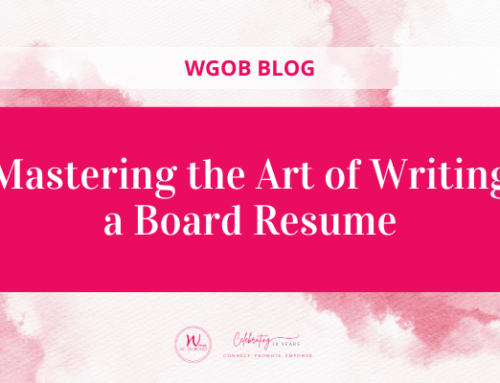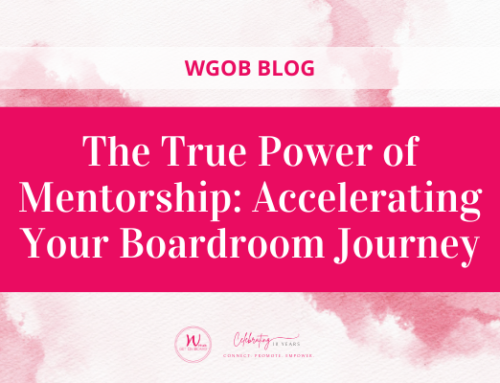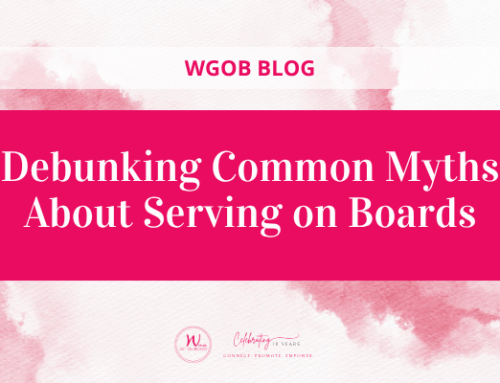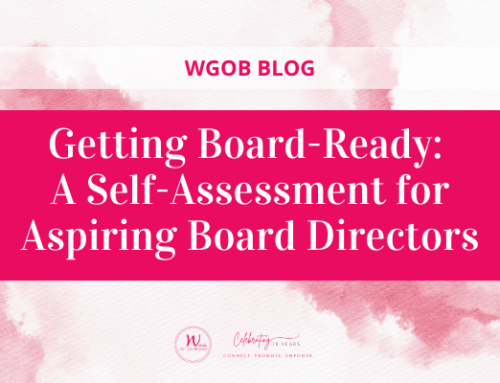Women Get On Board Inc. (WGOB) is a member-based company that connects, promotes and empowers women to corporate boards.
On February 15, WGOB hosted their virtual Speaker Series, which was sponsored by irlabs. In a panel format, leading experts offered guidance on building a strong and diverse board before going public.
Deborah Rosati, FCPA, FCA, ICD.D, Corporate Director & Founder and CEO, began the event by introducing Caroline Sawamoto and Alyssa Barry, Co-Founders & Principals at irlabs.
Caroline kicked off the discussion with an overview of the current state of diversity in the boardroom, drawing on her 15 years of investor relations experience. As a key element of her presentation, she examined gender diversity in new listings on the TSX and TSXV in 2021, utilizing research conducted by irlabs in partnership with WGOB.
With the stage set, Alyssa took over to introduce the discussion panel, which included:
- Julia Stamberger, Co-Founder, Chief Executive Officer and Chair of Board of The Planting Hope Company Inc.
- Cathy Logue, Managing Director, Global Practice Leader, CFO & Private Equity of Stanton Chase
An all-woman board of a newly listed public company
On board diversity, Julia was able to offer the audience a poignant and unique perspective. In November 2021, her company The Planting Hope Company (“Planting Hope”) launched a successful IPO on the TSXV—with an all-woman board and C-suite.
Why an all-women board? Julia said her team made the decision because they were thinking about their customers. Planting Hope is an up-and-coming brand in the plant-based and sustainable food industry, developing plant-based pantry staples for everyday use. Market research shows that 90% of the customers in the industry are women.
“So, for us, it made a lot of sense for our company to look like our core customer,” explained Julia.
For Julia, the move seemed obvious. Not only did she and her co-founders hope to be advocates for more female representation on boards and the c-suite, but she also knew that having a female-focused board would benefit their shareholders and their products. Plus, she had learned from decades of business experience that countless great candidates were available. Sure enough, the Planting Hope team had no problems securing top-quality candidates who could lead the company through the IPO.
Still, Julia was surprised to find out there are not many comparable public companies with all-women boards.
On the other hand, Cathy—a leader with two decades of experience in executive search—said she was not surprised to learn that the Planting Hope board is one of the first of its kind. In her role, she has observed that the corporate world still has plenty of work to do yet to improve board diversity. However, Cathy said she prefers to see this challenge as an opportunity rather than becoming discouraged. The companies she works with are typically pre-IPO firms building their boards for the first time. That means they are uniquely positioned to break new ground and build diversity into the blueprint for their company—just like Planting Hope did in their IPO.
“There’s a ton of opportunity out there,” said Cathy. “But it takes awareness and commitment to action and impact.”
Building diverse boards
So how can companies build a strong and diverse board before they go public? As an executive search expert, Cathy has developed proven strategies to bring more diversity into the boardroom.
First, she encourages leaders to seek board candidates outside their usual circles. Too often, pre-IPO companies only draw on their immediate networks, and this practice limits board diversity.
As an example, Cathy recalled the case of a client—an energy company—that requested a female chair for their audit board. They were concerned. They knew they wanted more diversity, but they were worried that there wouldn’t be any qualified female candidates available. However, Cathy’s team was able to find an ideal board candidate—someone in the industry with whom the company’s leaders were not familiar. Cathy said that the board search wasn’t difficult; it simply required looking beyond the boards’ professional networks.
Julia agreed with this strategy. Although Planting Hope’s board candidates came primarily through Julia’s network, she said it was important to expand her search beyond her immediate circle. Julia and her team expended the additional effort to look past their first-degree connections and reach out to their wider network of second- and third-degree contacts.
Cathy and Julia also added that supportive male leaders are vital for bringing more women onto boards. When men lead on this issue, everyone benefits. Julia mentioned that a male colleague played a critical role in referring female candidates for the Planting Hope board who brought the specific expertise they needed.
“We found so many super qualified women who had so much to bring to the table,” said Julia.
But what about after the IPO? To ensure that a public company continues to generate more board-ready women, management should begin building a pipeline of female leaders. That means developing, championing and promoting women to ensure they will be prepared to serve when the executive and board positions become available. Cathy said she sees this pipeline as critical to getting more women on public boards in the long term.
The power of diversity
Julia and Cathy have seen firsthand how women directors strengthen boards by bringing fresh perspectives and vital skills and experience.
On the Planting Hope board, Julia said that she already sees the impact of recruiting a team of top-quality female directors. The company is drawing on the experience of women who have enjoyed lengthy, successful careers in their fields and are committed to creating value for stakeholders.
Julia also mentioned that in addition to diversity in gender, ethnicity and sexual orientation, it’s essential for leaders to seek out a diversity of backgrounds and experience in their directors. If your board doesn’t include a variety of perspectives, it simply will not be as effective.
Cathy agreed and reminded the audience what the research tells us—that diversity in the boardroom leads to stronger boards and greater returns for shareholders.
“The data shows that companies with diverse boards perform better. It’s irrefutable,” Cathy said.
Julia said she and her co-founders are confident that Planting Hope will be no exception. She expects that the company’s all-woman board will deliver strong financial results for their shareholders and customers.
She is also proud that her board and c-suite will showcase a powerful example for other companies and the next generation of women business leaders.
“We have to show women what’s possible,” said Julia.
Are you a serving or aspiring director interested in learning more about showing courage in the board room? Then, join us for our next WGOB Speaker Series on April 27: Courage in the Boardroom. In this WGOB Speaker Series virtual event, sponsored by DirectorPrep.com, you’ll discover what we mean when we refer to governance courage—the courage that gives savvy directors the confidence to ask the right questions at the right time. Register here.






